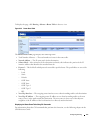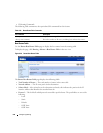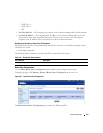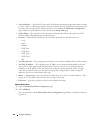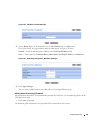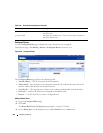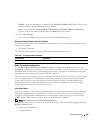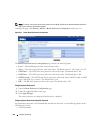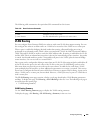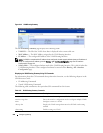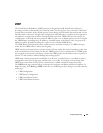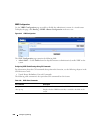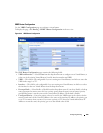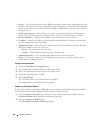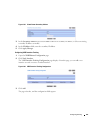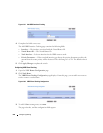
Configuring Routing 585
The following table summarizes the equivalent CLI commands for this feature.
VLAN Routing
You can configure PowerConnect 6200 Series software with some VLANs that support routing. You can
also configure the software to allow traffic on a VLAN to be treated as if the VLAN were a router port.
When a port is enabled for bridging (default) rather than routing, all normal bridge processing is
performed for an inbound packet, which is then associated with a VLAN. Its MAC Destination Address
(MAC DA) and VLAN ID are used to search the MAC address table. If routing is enabled for the VLAN,
and the MAC DA of an inbound unicast packet is that of the internal bridge-router interface, the packet
is routed. An inbound multicast packet is forwarded to all ports in the VLAN, plus the internal bridge-
router interface, if it was received on a routed VLAN.
Since a port can be configured to belong to more than one VLAN, VLAN routing might be enabled for all
of the VLANs on the port or for only some of the VLANs on the port. VLAN Routing can be used to
allow more than one physical port to reside on the same subnet. It could also be used when a VLAN
spans multiple physical networks, or when additional segmentation or security is required. This section
shows how to configure the PowerConnect 6200 Series
software to support VLAN routing. A port can be
either a VLAN port or a router port, but not both. However, a VLAN port may be part of a VLAN that is
itself a router port.
The VLAN Routing menu page contains a link to a web page that displays VLAN Routing parameters
and data. To display this page, click Routing
→
VLAN Routing in the tree view. The following web page is
accessible from this menu page:
• VLAN Routing Summary
VLAN Routing Summary
Use the VLAN Routing Summary page to display the VLAN routing summary.
To display the page, click Routing
→
VLAN Routing
→
Summary in the tree view.
Table 9-36. Route Preference Commands
CLI Command Description
ip route Configures a static reject route.
ip route distance Sets the default distance (preference) for static routes.



